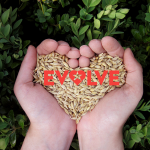What is energy, and why do we need it?
‘And what is a man without energy? Nothing – nothing at all’ – Mark Twain
Energy is something each and every one of us needs to function each day. Energy is needed so we can think, breath, sweat, chew, walk, run, digest food, play, sing, laugh, talk and even sleep. Energy is truly needed for everything we do.
Essentially everything living must have energy in order to live.
Energy is what is needed to make sure we are fueled to get through the activities in our day, as well as to provide what we need to grow and develop healthily.
Think of a light bulb, just as a light bulb needs energy in the form of electricity to function and light our homes, we need our own energy to function so we can get out of bed each day and complete our ‘to do list’.
Where do we get energy?
Carbohydrates should be our main source of energy and are in most foods we eat. Carbohydrate rich foods are an excellent source of energy and should be eaten frequently throughout the day. If we eat the right types of carbohydrate rich foods, they can also give us other key nutrients which are important for our overall health.
Carbohydrates keep our blood sugars consistent which helps us with our concentration and ability to think and stay focused – this is particularly important when we are in school and trying to learn new things.
Examples of carbohydrate rich foods include:
- Wholegrain breakfast cereals such as wheat biscuits and rolled oats
- Breads and rolls where you can see the seeds and grains (often referred to as multigrain)
- Rice, pasta, noodles, quinoa and couscous
- Milk or yoghurt
- All fresh fruit, dried fruit*, fruit juices* and grain bars* (such as muesli bars)
- *Be careful of eating too many of these as they are often high in sugar!
- Potato, sweet potatoes and legumes.
While we all like sweet treats, and these are generally high in energy, try your best to limit your intake of sweet drinks, lollies and chocolate. Sweet treats can fill us up, and as a consequence, replace foods which provide other nutrients needed for our bodies to thrive. Sweet treats can also provide us with too much energy too quickly and are often bad for our teeth.
What about energy for athletes?
Increased intake of carbohydrates around training and competition can help our muscles store more energy for use. Remember, the more training and competitions you are taking part in, the more carbohydrate rich foods you are likely to need.
You may feel at your best having your last meal 2-4 hours before any intensive exercise or training but a carbohydrate rich snack 1-2 hours before you start may give you a good ‘top up’.
How much energy do I need exactly?
As we are all different, we all have different energy needs. Each of us each has a different daily routine and takes part in different levels of activity so we need to keep this in mind. What works for one of us, will certainly not work for another. Just as we aren’t all going to be a flyer, we aren’t all going to need the same amount of energy.
What we can say, is that we usually benefit from a large amount of our daily food coming from carbohydrate rich foods and this is true for adults, children and teenagers. So, it would be a good idea to include some carbohydrate rich foods at every meal and snack. For example, wheat biscuits with milk at breakfast, a serve of fruit and/or some crispbreads for morning tea, a cheese salad sandwich with lunch, a glass of milk and/or a crumpet at afternoon tea, pasta or rice with dinner and fruit with yoghurt at supper.
By doing this it will help to ensure we all have enough energy to be the best at cheer we can be.
References
- Eat for Health, The Australian Dietary Guidelines
https://www.eatforhealth.gov.au/guidelines - Nutrient Reference Values (NRV)
https://www.nrv.gov.au/dietary-energy - Dietitians Association of Australia
https://daa.asn.au/smart-eating-for-you/smart-eating-fast-facts/nourishing-nutrients/carbohydrates-what-you-need-to-know/ - Sports Dietitians Australia
https://www.sportsdietitians.com.au/factsheets/ - Australian Institute of Sport
https://www.sportaus.gov.au/ais/nutrition/resources




